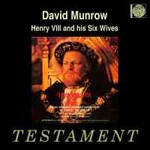
Henry VIII and his Six Wives
 $38.00
Out of Stock
$38.00
Out of Stock6+ weeks add to cart
VARIOUS COMPOSERS
Henry VIII and his Six Wives
The Early Music Consort of London / David Munrow
[ Testament / CD ]
Release Date: Tuesday 11 April 2006
This item is currently out of stock. It may take 6 or more weeks to obtain from when you place your order as this is a specialist product.
David Munrow (August 12, 1942 - May 15, 1976) was a musician and early music historian. He was the son of Albert Munrow, a Birmingham University lecturer and physical education instructor who even wrote a book on the subject, and was so highly respected that a sports centre was named after him. David Munrow himself attended King Edward's School, Birmingham, until 1960. He excelled academically.
In 1960 David Munrow went to Peru, teaching English under the British Council Overseas Voluntary Scheme. He returned with Bolivian flutes and other obscure instruments. Studying English at Cambridge University he noticed a crumhorn on a friend's wall and threw himself into independent study that climaxed in his book Instruments of the Middle Age and Renaissance (1976). From his starting position as a pianist, singer and bassoonist he taught himself many long-dead instruments. He joined the Royal Shakespeare Company as a bassoonist but soon played instruments of Shakespeare's time. Although he displayed prodigious talent on a wide variety of instruments he had a particular lasting influence as a recorder player - his 'English' style of discreet, controlled expression being in marked contrast to the greater tonal flexibility displayed by the 'Continental' style espoused by the likes of Frans Bruggen. By 1967 he was a lecturer at Leicester University and married to Gillian Reid. He teamed up with Christopher Hogwood to form the Early Music Consort whose core members were all experts in their own rights. Sometimes, other professional musicians were employed when necessary such as Nigel North, and the late Robert Spencer both highly regarded lutenists. Beginning in 1968 he toured the world, unearthing obscure instruments in every country he visited. He commissioned reconstructions of instruments related to the cornett and racket from, amongst others, Otto Steinkopf. In 1970 two television programmes made him a household name - The Six Wives of Henry VIII and Elizabeth R.
He was a man of manic energy. In his short life he released over 50 albums, some of them becoming available again through CD reissues. As well as his recordings with the Early Music Consort, he recorded with Michael Morrow's Musica Reservata, Alfred Deller and the King's Singers. He recorded Bach and Monteverdi many times but his widest influence was in the backwaters of the Gothic and Renaissance period. On BBC Radio 3 he presented "Pied Piper", a multi-ethnic, centuries-spanning spread of music from Monteverdi to ELO. Munrow also had dealings notably with the Young Tradition and Shirley and Dolly Collins.
His personal interests were travel, sailing, jazz and antiques. He was also something of a linguist. He also wrote a few articles on music, especially for his own recordings.
Munrow committed suicide in 1976, while suffering from depression. There are many rumours as to why. He found it difficult to delegate and often placed inhuman work demands on himself. There were also reports of him being being confused as to his sexuality. It appears from the original court records that he was deeply upset by the death of his father, and then shortly afterwards that of his father-in-law. This appears to be the key to his demise. Indeed, his only book is dedicated to both of them. On the day of his passing he and his wife Gillian were intending to go to Venice. However she found him hanging from the hayloft of their garage in Chesham Bois, Buckinghamshire. They had not lived in the area for long, and had previously had a home in St.Albans, Herts. Furthermore, Munrow had attempted suicide via a drug overdose in 1975. James Bowman, his singer for his Consort, lost his singing voice because of the shock of his death, and had to be re-trained.
Arguably, David Munrow did more than anyone else in the last century to popularize early music, despite a career lasting barely ten years. This is his claim to fame. Indeed, this is underlined by the fact that the committee which chose the music for the Voyager Golden Record selected one of his recordings to be sent on the Voyager space probes on an interstellar journey.
Apart from his regular radio slot and other programmes he also appeared on television, most notably a series entitled Ancestral Voices (BBC2)in a London studio, and Early Musical Instruments (ITV) filmed on location at Ordsall Hall, Salford. By such means, he introduced many people to a whole new world of audio experience. Sadly, these specific programmes were transmitted posthumously.
David Munrow left behind him not only his recordings, but also his huge collection of musical instruments. The Royal Academy of Music has a very large archival collection of his letters, programmes, notes, corrected tv scripts, scores, musical compositions, books etc. which are all accessible to the public. The online catalogue of the National Sound Archives (part of the British Museum) reveals his many recording entries, and those of many other noted people.
David John Munrow (MA) was undoubtedly one of Britain's brightest and best.
Tracks:
Basse Danse 'Jouyssance Vous Donneray'
Pavane 'Le Bon Vouloir'
Galliard 'Traditore'
Fireworks Music
The King's Ballad: 'Pastime with Good Company'
'Le Petit Gentihomme'
The Ballad of Robin and Marion
Street Music
Henry's Loneliness 1
The Joust at Westminster
Henry's Loneliness 11
The King's Hunt
Fanfare 'La Mourisque'
Galliard
La Pastorella
Galliard
Regal Solos" King Harry V111 (Pavan-Galliard)
and much more
